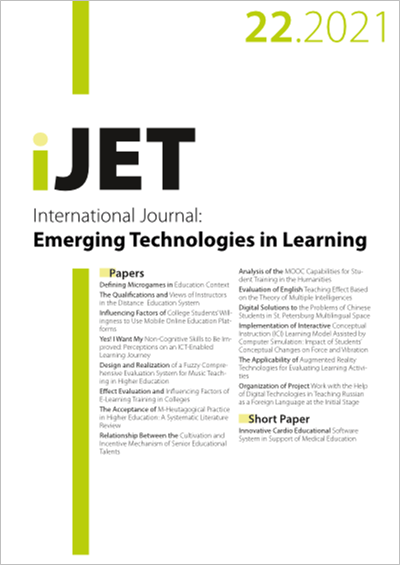Yes! I Want My Non-Cognitive Skills to Be Improved: Perceptions on an ICT-Enabled Learning Journey
DOI:
https://doi.org/10.3991/ijet.v16i22.24665Keywords:
Non-cognitive skills, NCS, Assessment, Lifelong learning, Technology mediated learning, User perceptionAbstract
Non-cognitive skills (NCS) are important for personal development and enhancing employability. However, as related literature points out, designs for NCS development are challenged by their fidelity, complexity, technology pedagogy and content value, user-centricity and so forth. Thus, this study investigates on 1) how do individuals recognise their needs, challenges and motivations for improving NCS, and 2) how do they envision their individual roadmap towards NCS achievement. An exploratory strategy is followed in capturing the learners’ perceptions. Expected data were collected by a questionnaire aiming at a sample of 80 purposely selected employable adults, followed by interviews with 11 randomly selected individuals among the sample. The outcomes provided feedback towards optimising design concepts for an NCS learning environment. Consequently, the framework for NCS improvement must include components, in the order of importance, tools for assessment of NCS, premises for learning NCS, dynamic CV, and linking to the occupations of individual interests as envisioned by the respondents. The participants recognised the significance of NCS and that NCS contribute meaningfully to their personal and professional growth. As such, research efforts shall be invested in evaluating the methods and tools in a systematic user-centric process to determine their effectiveness and impact in lifelong learning.
Downloads
Published
2021-11-30
How to Cite
Petritsopoulou, M., Karunaratne, T., & Glinos, M. (2021). Yes! I Want My Non-Cognitive Skills to Be Improved: Perceptions on an ICT-Enabled Learning Journey. International Journal of Emerging Technologies in Learning (iJET), 16(22), pp. 42–58. https://doi.org/10.3991/ijet.v16i22.24665
Issue
Section
Papers
License
Copyright (c) 2021 Maria Petritsopoulou, Thashmee Karunaratne, Myrsini Glinos

This work is licensed under a Creative Commons Attribution 4.0 International License.



